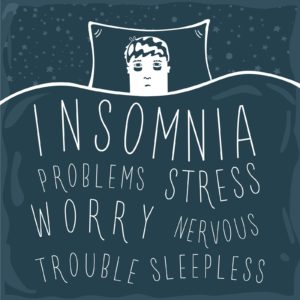According to various studies, a very high percentage of people around the world, suffer from insomnia. However, with sleep therapy, massages, herbal infusions, and relaxation exercises, experts say that a pleasant night’s rest can be achieved. Submit to these treatments! Otherwise, you will wake up so tired, you will sleep all day.

Insomnia … an increasing worldwide problem
In a study conducted among 600 families, 57% of them reported having had trouble sleeping.
It is the most frequent sleep disorder in the general population. It consists in a reduction of the capacity to sleep, being able to manifest itself in different ways that give rise to different types:
Home insomnia: problems to start sleeping in less than 30 minutes.
Maintenance insomnia: Problems to maintain sleep, with nocturnal awakenings taking place of more than 30 minutes duration, or awakening definitively in a precocious way obtaining a total time of little sleep.
The lack of sleep can negatively affect the life of the person who suffers it, causing social, occupational or other important deterioration. The number of hours of sleep required varies from one person to another. Although the daily average is 7 and a half hours, there is a range from 4 (“little sleepers”) to 10 hours (“large sleepers”), these values being considered within the normal.
People who suffer from insomnia often complain about some of the following problems:
Difficulty falling asleep. Difficulty to maintain sleep (they wake up several times at night). Early awakenings at dawn. The sensation of not sleeping well.

During the day people with insomnia usually have Tiredness or sleepiness. Anxiety or depression. Memory disorders or reduction of attention. Irritability, nervousness.
What can cause insomnia?
There are many causes that can cause insomnia. Psychiatric diseases such as anxiety and depression disorders. Inadequate sleep hygiene (sleeping naps, consuming caffeine and/or alcohol, intense physical activity before bedtime, irregular bedtime / getting up, staying in bed for many hours, doing intellectual activities before going to sleep, etc.).
Chronic diseases that present pain or shortness of breath (rheumatic diseases, fibromyalgia, COPD, asthma, heart failure, gastroesophageal reflux, gastric/duodenal ulcer). Diseases that occur during sleep (sleep apnea syndrome, restless legs syndrome, periodic movements of the legs, etc.). Medications (stimulants, antidepressants, suppression of sedatives or hypnotics). Irregular sleep pattern, rotating work schedules. Idiopathic (without apparent cause). Pseudoinsomnia (the patient complains that he does not sleep well even though sleep studies show no abnormalities).

It is better to sleep less but to sleep deeply
Insomnia not only means little sleep, but it is also sleeping badly. It is a light or agitated dream, which does not respect the phase of deep sleep, nor the phase in which one dreams. To be truly useful, sleep must be of good quality, since the action of sleeping is essential for the physical and emotional balance of the individual.
Is there a type of person who is more likely to suffer from these disturbances? While doctors say that people 45 and older are more likely to suffer from insomnia, other doctors, argues that there is no prototype that represents people suffering from insomnia. It all depends on the degree of anxiety that the individual accumulates during the day and the control they have to eliminate this tension. That is, a housewife can suffer more tension and insomnia than an executive. Again, everything is a matter of the accumulation of tension and the ability to release it.
Some useful advice
Insomnia can be of long duration, caused momentarily by a stressful situation, or persist due to a nervous problem. In this case, we must enter the field of pathology, an exclusive field for doctors. But if the disturbance is temporary, it is enough to modify, for a certain time, your habitual behavior and lifestyle. Follow these tips:
1. Go to bed a little later than usual.
2. If you can not sleep, get out of bed. Read in the studio or watch TV until you get sleepy.
3. Avoid mid-afternoon naps.
4. Try not to drink coffee, tea, carbonated soft drinks or alcoholic beverages, at least three or four hours before going to sleep.
5. Stay active during the day. If possible, practice a sport or do exercises that exhaust you.
6. Eat something light at night. Very heavy foods affect sleep.
7. If your budget allows, use linen sheets. It has been scientifically proven that when it comes into contact with this natural fiber, the body relaxes more quickly.


